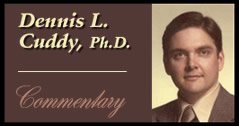Other
Cuddy
Articles:
Sept. 11:
Hold Government
Accountable
An
Economic Assault on
African-Americans and Others in The US
RELIGION AND WORLD GOVERNMENT
PART 2
By
Dennis L. Cuddy, Ph.D.
October 30, 2006
NewsWithViews.com
Among the agents of the power elite were the Dulles brothers, John Foster Dulles (Secretary of State under President Eisenhower) and Allen Dulles (CIA director under Eisenhower and President Kennedy). In preparing for an ecumenical conference at Oxford University, John Foster Dulles wrote "The Problem of Peace in a Dynamic World" (RELIGION IN LIFE, Spring 1937), in which he described the benefits of both Communism and Fascism in pursuing desirable social policies in the future World State.
In July 1937, the conference was held and among the participants were John Foster Dulles, Philip Kerr (Lord Lothian), and Sir Alfred Zimmern (a member of Rhodes' Association of Helpers, and probably Prof. Carroll Quigley's main source for "secret records" about Rhodes' secret society and plan "to take the government of the whole world," in Rhodes' own words). The proceedings of the conference were published in THE UNIVERSAL CHURCH AND THE WORLD OF NATIONS (1938), and contained Lord Lothian's "The Demonic Influence of National Sovereignty," in which he referred to "the evil of nationalism" and "the need for world government." In Zimmern's "The Ethical Presuppositions of a World Order," he emphasized the need to implement Auguste Comte's "Religion of Humanity." Comte in July 1851 published that "The objective of our philosophy is to direct the spiritual reorganization of the civilized world." According to Erica Carle in WHY THINGS ARE THE WAY THEY ARE (1996), Comte's "Religion of Humanity" was "to replace Christianity" by establishing "a World Management System based on service to collective Humanity rather than God." Sir Alfred Zimmern believed Comte's "Religion of Humanity" would be embodied in the League of Nations.
The year after Zimmern's and the other conference proceedings were published, on October 28, 1939, John Foster Dulles advocated that "Some dilution or leveling off of the sovereignty system as it prevails in the world today must take place...to the immediate disadvantage of those nations which now possess the preponderance of power....The establishment of a common money...would deprive our government of exclusive control over a national money...The United States must be prepared to make sacrifices afterwards in setting up a world politico-economic order which would level off any inequalities of economic opportunity with respect to nations." Dulles would call his approach "functionalism," which fit with the power elite's plan of bringing about a world government by linking regional economic arrangements. Just like the European (Economic) Community preceded the European Union, so too is the current plan for a North American Community to precede the North American Union. In June 1941, Dulles wrote a letter stating: "I would favor economic and financial union, letting the political union work out of them if and when this became a natural development."
The next year, Dulles chaired a meeting of 30 religious denominations called together by the Federal Council of Churches, and TIME (March 16, 1942) reported they adopted a program calling for "a duly constituted world government of delegated powers: an international legislative body, an international court with adequate jurisdiction, international administrative bodies with necessary powers, and adequate international police forces and provision for enforcing its worldwide economic authority." According to Robert Herzstein's biography HENRY R. LUCE (1994), TIME's editor-in-chief (Luce) was assured by Dulles that the Federal Council of Churches supported "world government as an ultimate ideal." Remember that the Federal Council of Churches was formed with financial support by the Rockefellers, and Dulles was an in-law of the Rockefellers. Luce was a member of Yale University's secret Skull & Bones society, as is President George W. Bush along with his father and grandfather.
Immediately after World War II, John Foster Dulles became chairman of the Carnegie Endowment for International Peace in 1946 (he chose Alger Hiss to be the Endowment's president), and in that same year, his brother Allen Dulles co-authored THE UNITED NATIONS, in which he projected: "There is no indication that the American public opinion, for example, would approve the establishment of a super state, or permit American membership in it. In other words, time---a long time---will be needed before world government is politically feasible....This time element might seemingly be shortened so far as American opinion is concerned by an active propaganda campaign in this country."
Religion would play an important role in this campaign to alter American opinion in favor of world government. The CHRISTIAN CENTURY (April 16, 1947) expressed concern that the U.N. "cannot hope to survive on any lesser terms than as an actual world government." And in this same magazine's January 14, 1948 issue, the editors opined: "We believe that the crisis of humanity demands that the churches...shall once again declare their faith in a world government...and shall throw themselves with all the resources they can command into the crusade to set up such a government."
While John Foster Dulles used Christian terminology in speeches, he really believed in the "universal brotherhood of man," and postulated that "the moral, or natural, law is (also) revealed through other (than Christianity) religions...so that it is a force far more universal than any particular religion." Later, on June 19, 1955, in an address to the San Francisco Council of Churches, Dulles indicated that the moral law is a pantheistic concept and "the religious people of the world can generate the motive power required to vitalize a world organization" like the U.N. At this time, Dulles had become an active member of the World Brotherhood.
But how would various religious views be brought together? Sir Julian Huxley, the first director-general of UNESCO, wrote in UNESCO: ITS PURPOSE AND ITS PHILOSOPHY (1948) that "the task is to help the emergence of a single world culture....Two opposing philosophies of life confront each other....You may categorize the two philosophies as two super-nationalisms, or as individualism versus collectivism...or as capitalism versus communism, or as Christianity versus Marxism. Can these opposites be reconciled, this antithesis be resolved in a higher synthesis? I believe not only that this can happen, but that, through the inexorable dialectic of evolution, it must happen...." "Dialectical Synthesis" is the favorite tactic of the power elite, whose goal is to synthesize Western Capitalism and Eastern Communism into a World Socialist Government.
And once the U.N.'s "single world culture" referred to by Huxley is brought about, then no American's appeal to "human rights" will matter, because Article 29 of the 1948 Universal Declaration of Human Rights states that "...these rights and freedoms may in no case be exercised contrary to the purposes and principles of the United Nations."
|
Subscribe to the NewsWithViews Daily News Alerts! |
Two years after the Universal Declaration was written, John Foster Dulles as chairman of the board of the Rockefeller Foundation took John D. Rockefeller III on a tour of Third World countries in 1950-1951 stressing the need eugenically to control the growth of non-white populations. The next year (1952), Rockefeller and Dulles formed the Population Council. Both Dulles brothers also believed the government should use mass psychology, which was in line with the goal of the Rockefeller Foundation as its president Max Mason expressed to its board of trustees on April 11, 1933: "The Foundation's Social Sciences will concern themselves with the rationalization of social control,...the control of human behavior." For part one click below.
Click here for part -----> 1,
� 2006 Dennis Cuddy - All Rights Reserved
Order Dennis Cuddy's new book "Cover-Up: Government Spin or Truth?"
Sign Up For Free E-Mail Alerts
E-Mails are used strictly for NWVs alerts, not for sale
Dennis Laurence Cuddy, historian and political analyst, received a Ph.D. from the University of North Carolina at Chapel Hill (major in American History, minor in political science). Dr. Cuddy has taught at the university level, has been a political and economic risk analyst for an international consulting firm, and has been a Senior Associate with the U.S. Department of Education.
Cuddy has also testified before members of Congress on behalf of the U.S. Department of Justice. Dr. Cuddy has authored or edited twenty books and booklets, and has written hundreds of articles appearing in newspapers around the nation, including The Washington Post, Los Angeles Times and USA Today. He has been a guest on numerous radio talk shows in various parts of the country, such as ABC Radio in New York City, and he has also been a guest on the national television programs USA Today and CBS's Nightwatch.
E-Mail: Not Available
once
the U.N.'s "single world culture" referred to by Huxley is brought about,
then no American's appeal to "human rights" will matter, because Article
29 of the 1948 Universal Declaration of Human Rights states that "...these
rights and freedoms may in no case be exercised contrary to the purposes
and principles of the United Nations."












